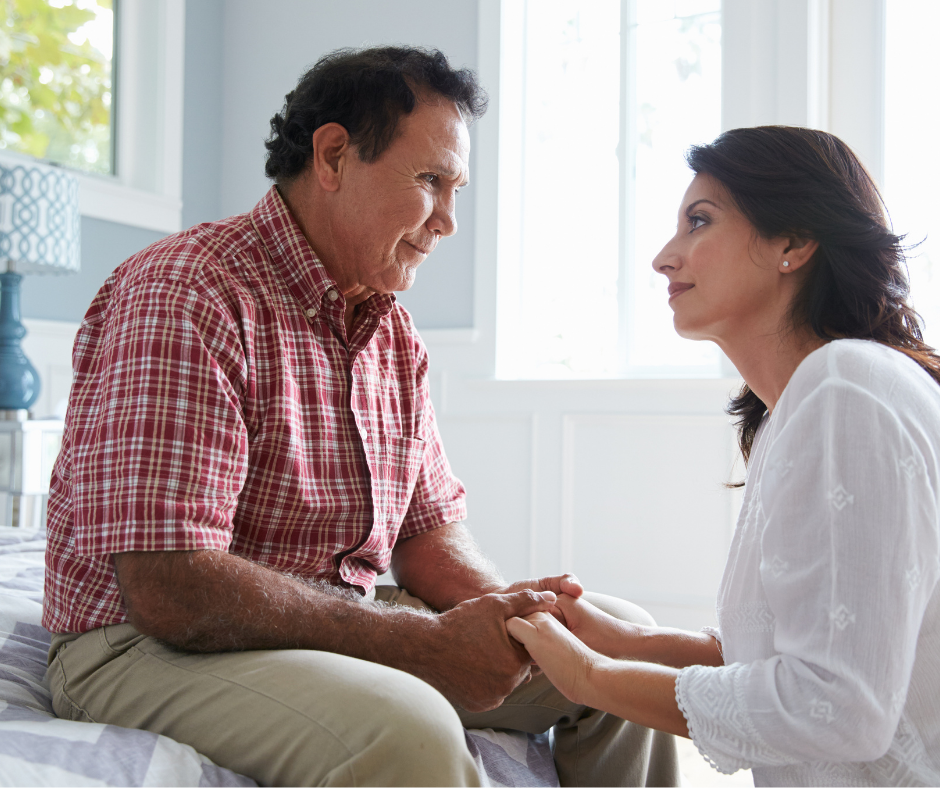
Our country is in a behavioral health crisis and our seniors aren’t immune to it. Those aged 65 years and older are vulnerable to depression as their activities slow down and they are prone to the effects of age-related conditions such as dementia and Alzheimer’s.
May is Mental Health Awareness Month, and more than 350 million people worldwide suffer from depression according to the World Health Organization. Blue Water Homecare would like to share depression signs to watch for in your elderly loved ones so you may recognize them and intervene swiftly.
What are signs of depression in seniors?
Depression is often characterized by at least two weeks of a person experiencing a depressed mood or loss of interest (or pleasure) in daily activities and is typically accompanied by challenges related to sleep, eating, motivation, concentration, or self-esteem.
In someone older, depression may also include frequent bouts of forgetfulness, excessive fatigue, or feeling like loved ones have no use for them any longer.
“We work hard to ensure that every one of our clients’ physical being is safe and comfortable as we serve them through our at-home care, but we also always pay special attention to their mind and mental well-being,” says Blue Water Homecare and Hospice Founder and COO, Jennifer R. Prescott, RN, MSN, CDP,
“Check in on your senior loved ones often, and if you suspect they are feeling down, introduce small gestures to help lift their spirits and show them as much love and affection as you can. If you feel their mental state declines rapidly or remains fragile over a period of time, then never hesitate to seek support for them.”
How can you help a senior with depression?
A few tips that our experienced team of at-home caregivers offers for helping your loved one weather a state of depression include:
- Alleviating any sleep issues.
Irregular or insufficient sleep can exacerbate depression. Ensuring that they get enough rest, and addressing any issues with sundowning (difficulty with changing times of the day), can help them feel more settled and clear-headed to tackle the other side effects that may be affecting them. Establish a regular nap or nighttime routine for them, and discuss sleep aids with a physician if the issue is serious.
- Providing a sense of purpose.
Elderly people often feel they are no longer needed once they retire and their own children are grown and on their own. This is when loneliness sets in and can trigger depression. Help find easy chores or tasks for them to accomplish each day, and give them milestones or events to look forward to on a calendar. Giving them something to take care of can also be uplifting, such as a small pet (one that suits their physical capabilities) or plants.
- Encouraging social interaction.
Help plan visits with friends and family closeby, or take them out for a meal, movie, community or sporting events on a regular basis so they remember the company and familiarity of being around people. Seniors who are left alone at home frequently can get too used to a lonely environment and begin retreating from others altogether.
- Stressing the importance of physical activity.
Moving each day can have an extremely positive effect on both physical and mental health. Even the simplest exercises such as walking or yoga are great for releasing mood-boosting endorphins. Better yet, sign your loved one up for a senior fitness class that not only gets them moving but gets them around others as well.
Along with staying physically active, eating a healthy diet is also important for mental stability.
- Pursuing at-home care or professional help when needed.
If you become uncomfortable leaving them alone, or you need respite and someone else to check in on them daily or provide companionship, Blue Water can help. We offer personalized, safe, and comforting at-home care, or care in an assisted living or medical facility.
When signs of depression continue even after you’ve tried supporting your loved one on your own, discuss options for counseling, therapy, or even safe and helpful medications with their physician to help balance their moods and mental health.
Contact us today to learn how we can help you, and your loved one, ease the challenges of aging in place. And don’t forget to follow us on Facebook and Instagram.